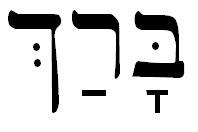by Lois Tverberg
When you have eaten and are satisfied, you shall bless the LORD your God for the good land which He has given you. (Deuteronomy 8:10)
 Paul tells us that we should “always be giving thanks for all things” (Ephesians 5:4). This sounds impossible to us, but prayers of thankfulness at all times of day were part of Paul’s Jewish context. Each one of them is called a blessing, berakah, and they are brief prayers that acknowledge God as the source of every good thing.
Paul tells us that we should “always be giving thanks for all things” (Ephesians 5:4). This sounds impossible to us, but prayers of thankfulness at all times of day were part of Paul’s Jewish context. Each one of them is called a blessing, berakah, and they are brief prayers that acknowledge God as the source of every good thing.
From before Jesus’ time until today, Jews have “blessed the Lord” for every good thing. In Psalm 103 it says, “Bless the LORD, O my soul, And all that is within me, bless His holy name.”
This seems strange to us, because it seems that God should do the blessing. However, the word bless, barak, in Hebrew, tells us something about the idea behind this custom. The word is related to the word “knee,” berek, and the verb can also mean to kneel, as even a camel does (Genesis 24:11)! The idea is that when we bless God, we mentally bow on our knees to worship him, and we are acknowledging him as the source of all blessing. As with many words, the meaning of it has expanded so that the same word, barak, bless, is used when we thank God in prayer and when he gives us good things.
Before the time of Christ, the Jews developed a number of short blessings to be said whenever the occasion arises, in addition to saying longer prayers in the morning and evening. In the Gospels it says Jesus “took the bread and blessed.” (The NIV says “gave thanks” but more literal translations use the word “blessed.”) We know what words he said: most likely, “Blessed is he who brings forth bread from the earth.”
We read that when Jesus did miracles, the people “glorified God”: probably exclaiming, “Blessed is he who has performed a miracle in this place!” It was customary to pray the blessing before leaving the site where a miracle occurred, or to return to the place to say it. So when Jesus heals ten lepers and only one, a Samaritan, comes back and loudly blesses God, Jesus wonders why the other nine haven’t returned to do the same thing (Luke 17:12 -19).
~~~~
Further reading:
If you would like to read more about prayers that Jesus prayed, and how other Jews pray even today, see The Richness of Jewish Prayer.
See Listening to the Language of the Bible, by Lois Tverberg and Bruce Okkema, En-Gedi Resource Center, 2004. This is a collection of devotional essays that mediate on the meaning of biblical words and phrases in their original setting.
For a friendly, bite-sized Bible study of five flavorful Hebrew words, see 5 Hebrew Words that Every Christian Should Know, by Lois Tverberg, OurRabbiJesus.com, 2014 (ebook).



